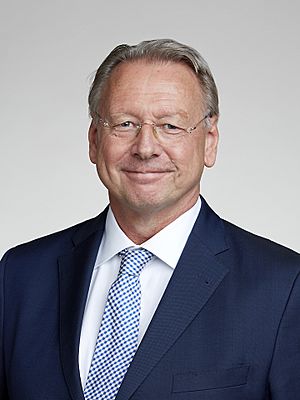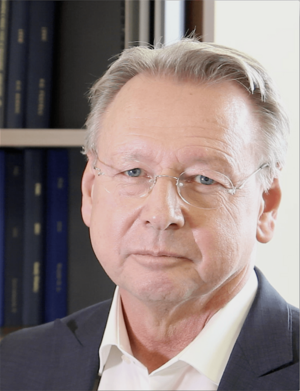Paul Workman (scientist) facts for kids
Quick facts for kids
Paul Workman
FRS FRSC FMedSci
|
|
|---|---|

Workman in 2016
|
|
| Born | 30 March 1952 Workington, Cumbria, England
|
| Nationality | British |
| Alma mater |
|
| Known for | Cancer drugs |
| Awards |
|
| Scientific career | |
| Institutions |
|
| Thesis | Studies on some enzyme-activated anti-tumour agents (1976) |
Paul Workman is a British scientist. He is famous for finding and making new medicines. These medicines help fight cancer. From 2014 to 2021, he led The Institute of Cancer Research in London. This is a place where scientists study cancer.
Contents
Early Life and Education
Paul Workman was born in Workington, England, on March 30, 1952. He went to school in Workington. He studied Biochemistry at the University of Leicester. Later, he earned his PhD in Cancer Pharmacology from the University of Leeds. This means he learned how medicines work against cancer. In 2009, the University of Leicester gave him an honorary science degree.
Career and Research in Cancer Medicine
Paul Workman spent the early part of his career, from 1976 to 1990, at the University of Cambridge. There, he started and led a lab focused on new drug development. He worked on treatments that target special cells in tumors. These cells are called hypoxic cells. He also studied how certain enzymes help activate these drugs.
In 1990, Workman worked at Stanford University in California, USA. He continued his research on how to target tumors that don't get enough oxygen. He received a special award to help fund this important work.
From 1991, Workman became a professor at the University of Glasgow. He continued his research on targeting tumors. He also worked on therapies that aim at specific molecules in cancer cells. He helped lead a group called the European Organisation for Research and Treatment of Cancer (EORTC). This group works to develop new cancer drugs.
Discovering New Cancer Drugs
In 1997, Paul Workman joined The Institute of Cancer Research (ICR). He helped build their Cancer Therapeutics Unit. This unit focuses on finding and developing new cancer treatments. Since 2005, his team has found 17 possible new drugs. Seven of these drugs have moved on to be tested in patients.
Workman says their success comes from taking risks early on. They combine ideas from universities and drug companies. They also have strong leaders and good project management. Working on many projects at once and getting long-term funding also helps. Most importantly, they work with companies at the right time.
From 2014 to 2021, Workman was the President and CEO of the ICR. He is currently working on drugs that stop cancer cells from growing. These drugs block molecules that cancer cells need to survive. One important type of molecule he studies is called Hsp90. His team at ICR, working with another company, found a leading drug that blocks Hsp90.
Awards and Recognition
Paul Workman has received many important awards for his work.
- In 2010, he became a Fellow of the Royal Society of Chemistry (FRSC).
- Also in 2010, he received the George and Christine Sosnovsky Award in Cancer Therapy.
- In 2014, he won the Raymond Bourgine Award for his "exceptional contributions to oncology."
- In 2016, he was elected a Fellow of the Royal Society (FRS). This is a very high honor for scientists in the UK.
 | Dorothy Vaughan |
 | Charles Henry Turner |
 | Hildrus Poindexter |
 | Henry Cecil McBay |


